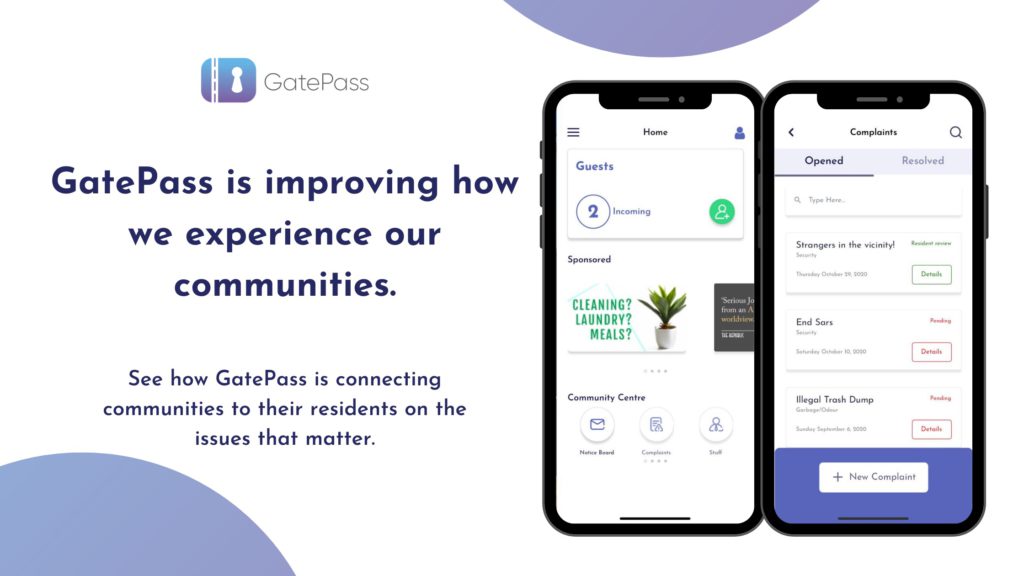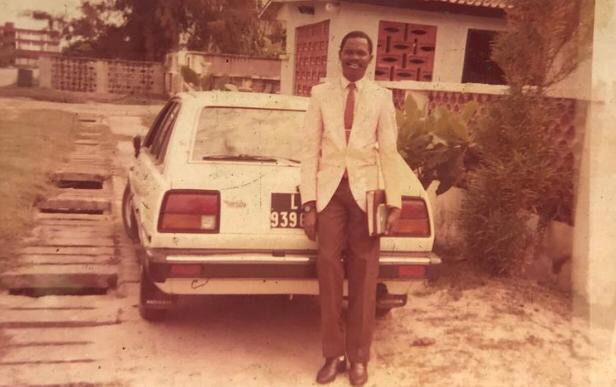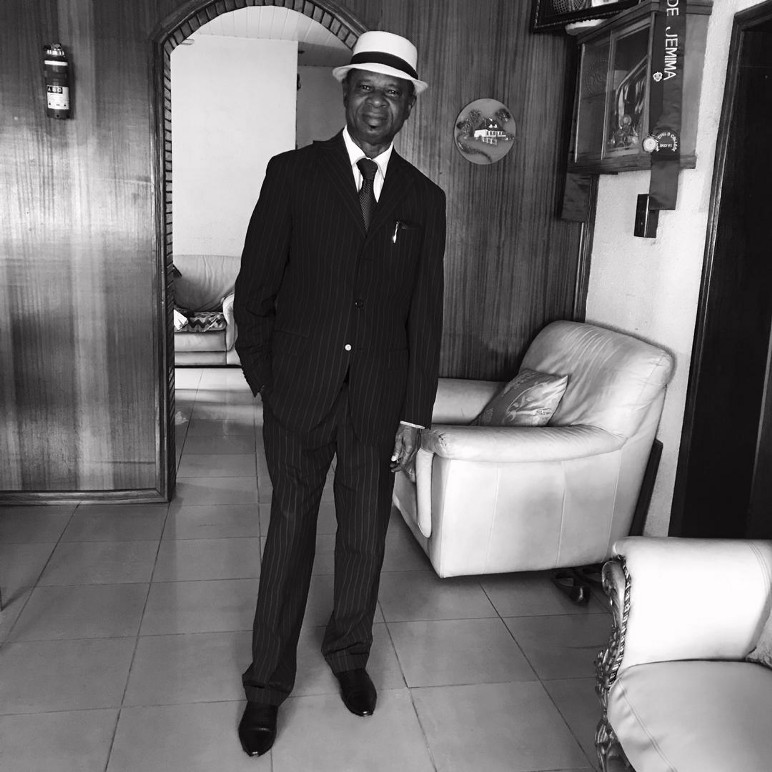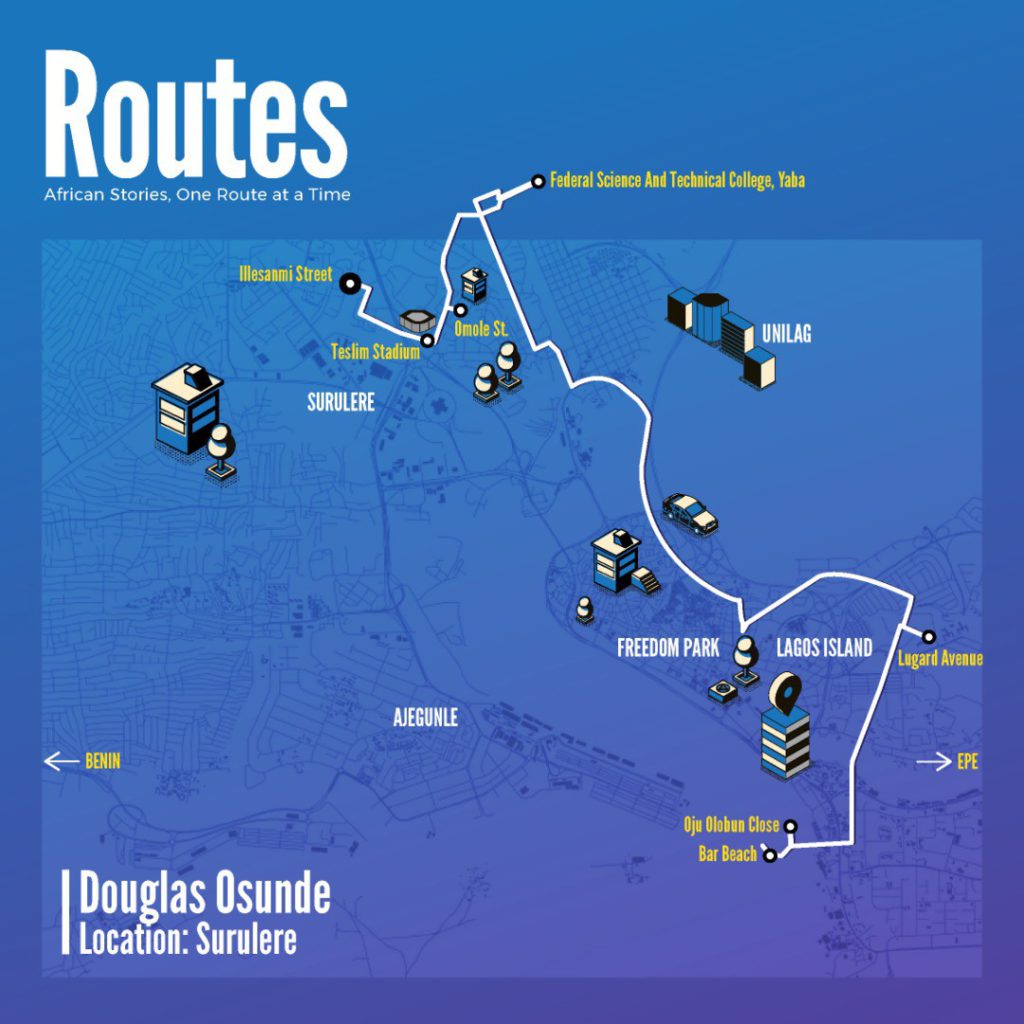
Lagos then was not as rowdy as it is now, although Lagos has been rowdy from the beginning. — Douglas Osunde, Surulere
Our questions are italicized.
What’s your favourite memory about the first street you lived on,in Lagos?
I grew up in Benin City, Edo State, and I came to Lagos when I was 22/23 years old. I think the year was 1974, and I lived at №2 Ilesanmi Street, Surulere. It was a housing estate of bungalows, very quiet, and it linked to Olukole Street, which linked to Masha Road. Shofidiya Close is off Ilesanmi Street, and Moshood ‘MKO’ Abiola used to live there before he moved to Ikeja. Before he left, we usually attended his parties. He drove a yellow Mercedes Benz at that time — with number plates: WE16A, we always called him “We 16a’’ I think WE meant Western Egba.
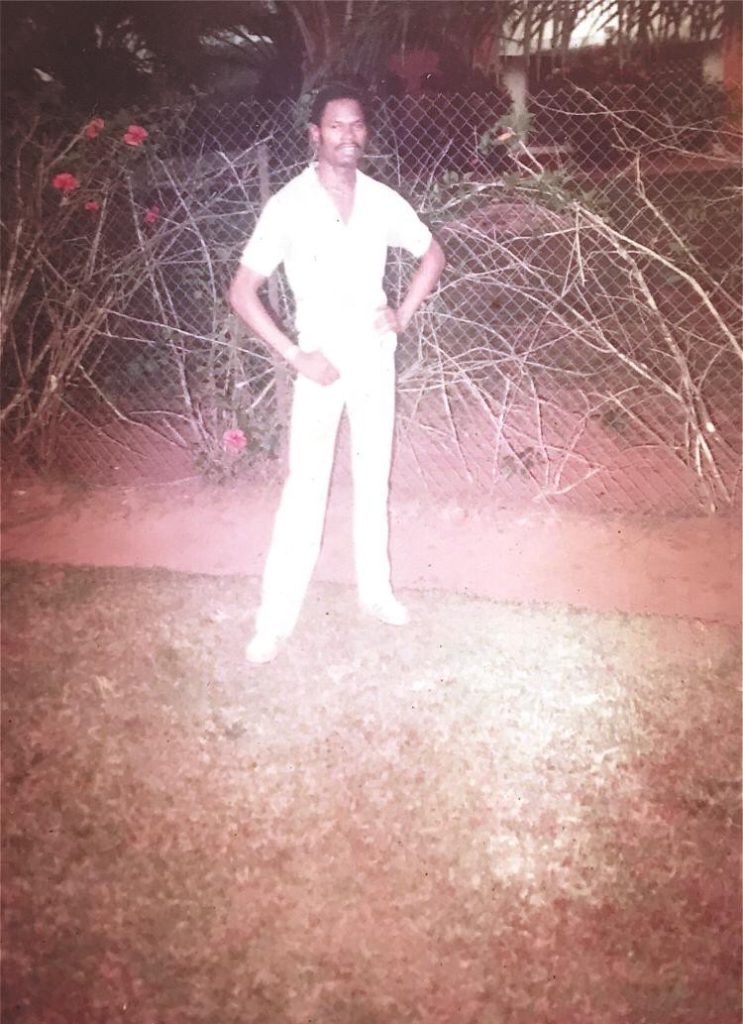
“My early years in Lagos,” (1970s). Photo Courtesy of Douglas Osunde.
Where were you when you found out MKO had died?
I think that was 1998, I lived in Ikoyi then. I was already working with the National Industrial Court.
What’s the longest you’ve had to travel for something?
Within Lagos, it’ll have to be from Surulere to Epe. I’ve done that a few times and the time varies, depending on the traffic. Sometimes, it took me more than 3 hours; other times, it was less.
What’s your daily commute?
I’ll answer this from two perspectives: When I used to work and after retirement. When I started working, I was with the Federal Ministry of Education. I was posted to Federal Technical College, Yaba. At that time, I lived at №82 Ojuelegba Road, and I would walk to the College. I had a shortcut I usually took. This was around the late ‘70s.
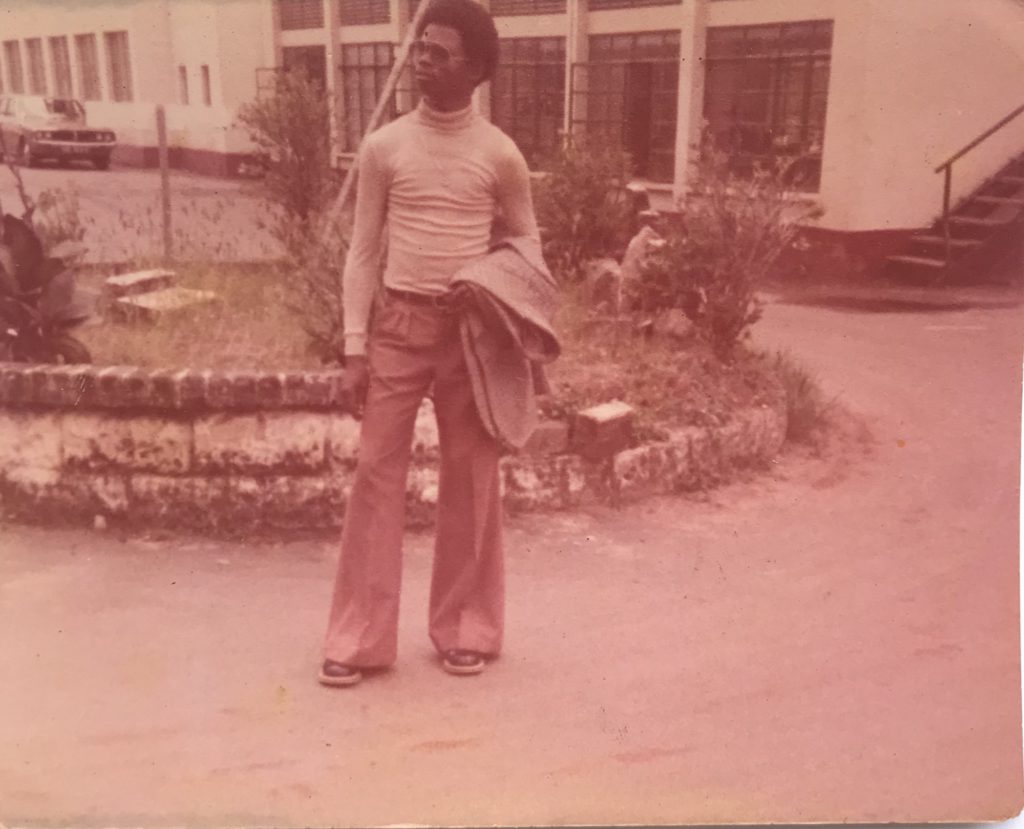
Federal Technical College, Yaba (1970s). Photo Courtesy of Douglas Osunde.
In 1982, I got a job with the National Industrial Court, my new office was at №22 Oju Olobun Close, Ikoyi. The official vehicle usually picked me up at 82 Ojuelegba, we passed through Yaba, Third Mainland Bridge, then Ikoyi. I later moved to №31 Lugard Avenue, Ikoyi. It was a walking distance to my office, but the official car always came to pick me up. Even though it was close, we still experienced traffic sometimes. Now I live in Surulere, which is very close to the National Stadium. A typical morning commute for me is I wake up and drive or walk (mostly walk) to the National Stadium. I then exercise for about an hour, then I walk back home.
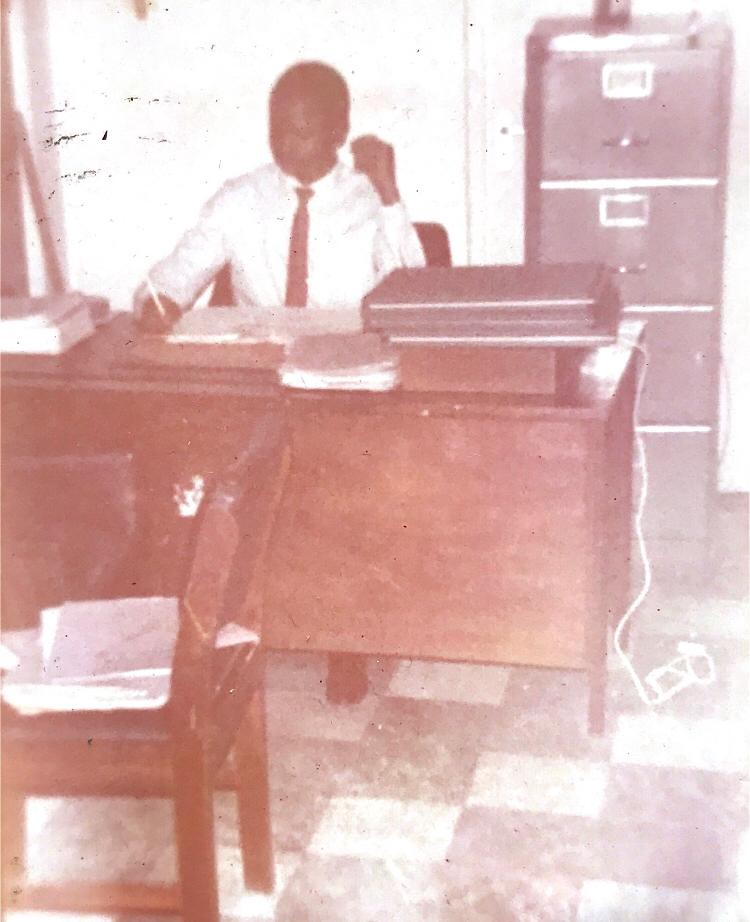
“My first office at National Industrial Court, Ikoyi,“ (1980s). Photo Courtesy of Douglas Osunde.
What’s the biggest difference between Lagos when you started working and Lagos after you retired?
I’d say Lagos then was not as rowdy as it is now, although Lagos has been rowdy from the beginning. It was Nigeria’s capital then so the population was still high. There are a good number of developments now though. I’d say there’s an improvement in the transportation sector but for the megacity we want Lagos to be, the city will need a robust transportation system. Right now, we’re only focused on road transport and that is not enough. Lagos needs proper rail networks and the waterways can be better than what is currently in place.
Left: “On my way home from the National Industrial Court, where I worked,” (1980s); Right: “On my way out, post-retirement.” (2019)
Car, Okada, Bus — what’s the best mode of getting around Lagos?
Car. My car.
What make is your car and where’s the farthest place you’ve driven it to?
My car is a silver Mercedes Benz ML350. The farthest I have had to drive it would be to my hometown in Benin City, Edo State.
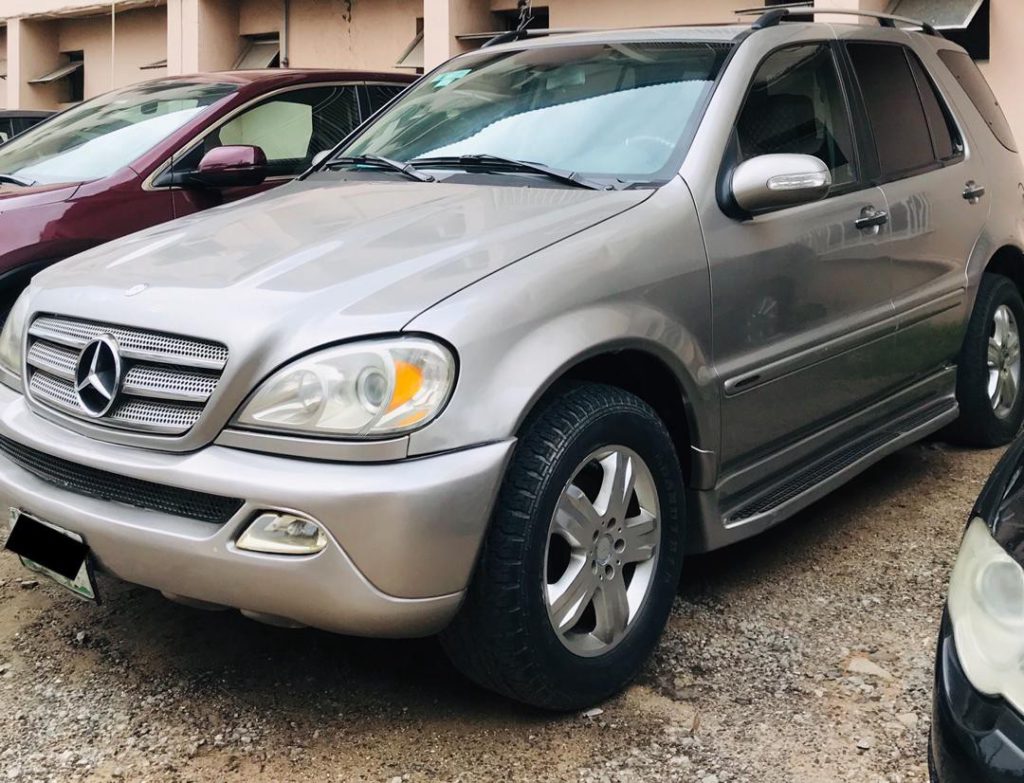
“My car is a silver Mercedes Benz ML350. The farthest I have had to drive it would be to my hometown in Benin City, Edo State.” (2019). Photo Courtesy of Douglas Osunde.
What’s an obvious part of Lagos that you’ve never visited?
I think that would be Igando. I have been in Lagos for a very long time, so I have visited most of the obvious places.
What’s one place in Lagos everyone should visit before they turn 20?
Bar Beach. Well, if it still exists.
It does. But not the way you might have experienced it. What was Bar Beach like during your earliest visits?
Back then, Bar Beach was a recreational place where you just sit and enjoy yourself with a great view of the Atlantic Ocean. Once you get there, vendors come around and sell you drinks. Life was more interesting then. Not now, where if you don’t have money you can’t go to the beach because everything is so expensive. In those days, everyone went to the beach; whether you had money or not you’d be able to sit and enjoy the view.
When was the last time you visited a new street?
Sometime in 2016. The street was somewhere in Lekki, just before Alpha Beach, but I can’t remember what it was called.
What’s something you know about Lagos that not too many people know?
There is this amala joint at Okanlawon Ajayi Street off Masha Road in Surulere. They open from the early hours of the morning to 11 a.m. When you go there in the morning, you see a lot of company executives parked by the side of the road. If you don’t get there before 11 a.m. forget it.
Tell us about a time you got there late.
So, the few times I got there after 11 a.m., it was because I had spent a lot of time at the National Stadium. I go there most mornings, so I head to the joint afterwards. If I get to the joint late it means I arrived at stadium late. When this happens, they are either closed or they tell me food is finished.
What’s a Lagos route you know by heart?
Surulere to Ikoyi. I used to live and work in Ikoyi and now I live in Surulere.
What’s one thing you always look forward to seeing on your street?
When I am driving home in the evening, I look forward to seeing the security lights on. This lets me know if there’s light in the area or people are running on gen.
Where were you the first time you noticed people using generators?
The first place I remember seeing a generator was somewhere on Ojuelegba Road, I think it was at a shop. I can’t remember the first house I saw a generator but I remember the year. I don’t recall generators being in Lagos in the 80s and early 90s. The light situation was much better then. Back then, when the NEPA wanted to take the light, they’d give you a signal. You’d see the bulbs dim about two or three times. And even when they took light, they’d bring it back shortly. It was towards the late 90s people started using generators and, even then, very few people had them, not like what we have today.
What’s the most you’ve had to pay to get from one place to another in Lagos?
I don’t have any memory of paying a lot for transportation within Lagos. I was mostly driven around in my official car and now I drive my own car. These days, I rarely drive out of Surulere, so I spend around N2,000 on fuel a day.
You’re going to a place you’ve always wanted to visit and can only take one thing. Where are you going and what are you taking?
If I could go anywhere right now, it would be New York. A very good friend of mine lives there and I also have great memories of my visits there. The one thing I would take is a suitcase with my “wears”.


Left: “At a Jazz concert at Madison Square Garden, New York” (Early 2000s); Right: “With my friend, Sunday Odiase.” (Early 2000s). Photo Courtesy of Douglas Osunde.
Douglas Osunde is a retired public servant. Born in Benin, Edo State, he moved to Lagos in 1974 and currently lives in Surulere.
About Routes
Routes by GatePass is mapping African stories one route at a time. This project sits at the intersection of life stories and mobility in African contexts. Through Routes, we explore how African lives are shaped by mobility, migration, journeys and modes of transport; and how places take on the stories of the people who have visited or passed through them.
Do you or someone you know have an interesting mobility story? Do you have a hack for moving around your city, or know something about your city’s history that not too many people know? Tell your story. We’re open to submissions and looking forward to reading!
Email: routes[at]gatepass[dot]io
Editorial Team
Editor / Publisher — Wale Lawal
Sub-Editor — Muyideen Dosumu
Interviewer — Nosa Osunde
Illustrator — Samson Msheila

